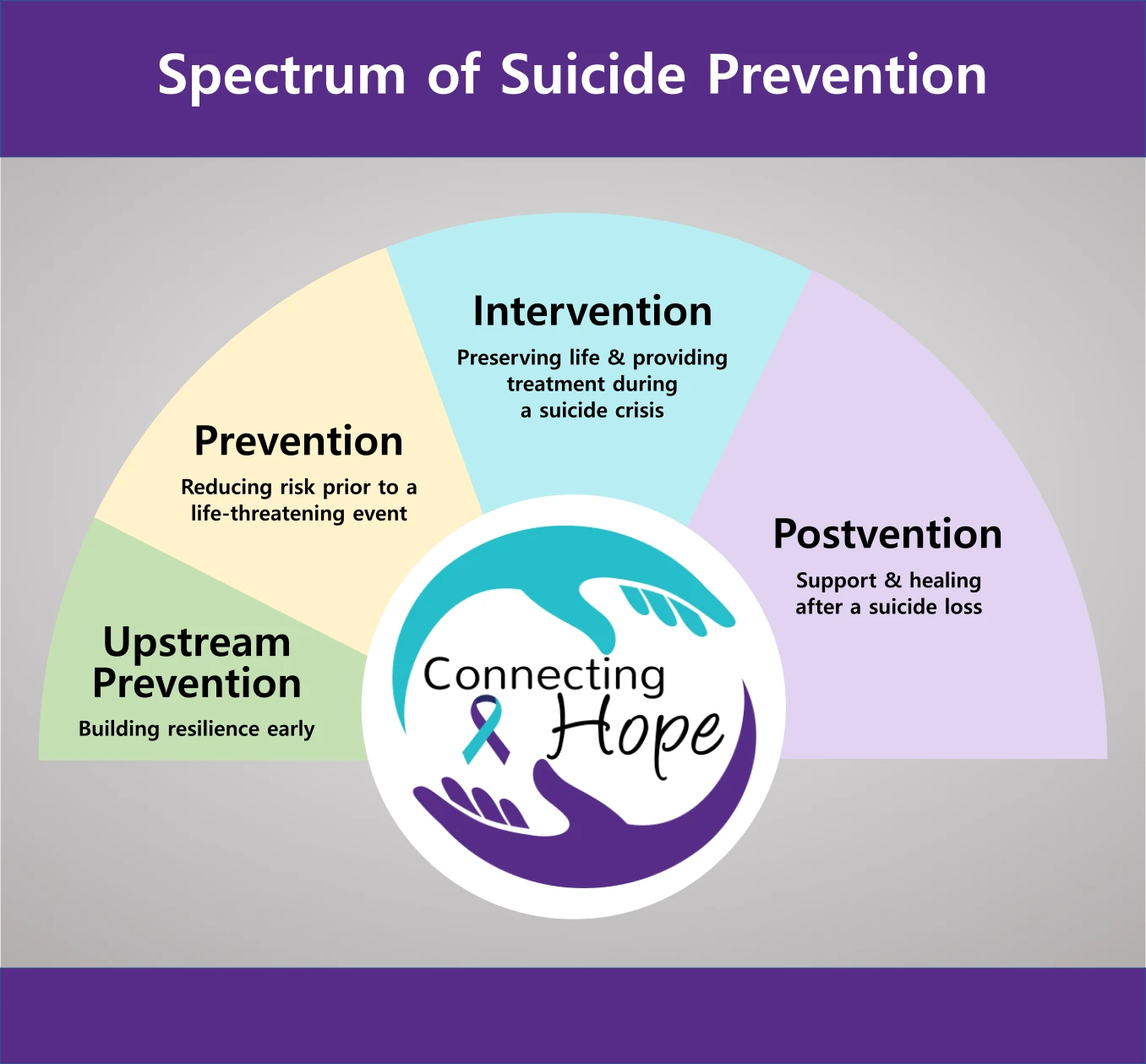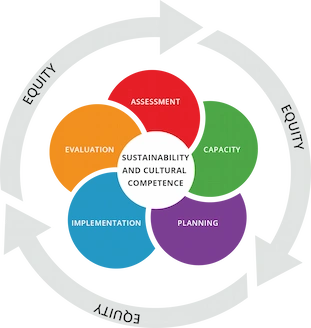Life can be overwhelming, and anyone can experience depression, anxiety, and thoughts of suicide.
There is Hope
There is Help
RECOVERY IS POSSIBLE
PILLARS OF
Prevention
Connect
Positive personal connections reduce the impact of risk factors for suicide
Communicate
Compassionate communication reduces feelings of isolation and desperation
Care
Timely, appropriate, and comprehensive care is the pathway to sustainable, long-term recovery
WHO WE ARE?
About Us
Established by the Georgia Legislature in 2009 (O.C.G.A. § 37-1-27), the Suicide Prevention Program is housed within the Georgia Department of Behavioral Health & Developmental Disabilities (DBHDD), Division of Behavioral Health, Office of Behavioral Health Prevention & Federal Grants (OBHPFG).
The Suicide Prevention Program works to reduce the risk and impact of suicide in Georgia. Our work can be categorized into four main areas, which make up the Spectrum of Suicide Prevention. [Link to How we prevent suicide – replaces Prevention pages under About Us]
Within each of these areas of prevention, the Suicide Prevention team uses a variety of approaches to address the unique needs of providers, partners, and communities. These approaches include:
- Data-driven decision making
- Collaborative partnerships
- Public policy
- Training & technical assistance
- Best practices & evidence-based interventions
- Postvention support
- Community capacity-building


Prevention Works

New Vision for my Organization
Initiatives
Federal Grant Projects
The MHAT Project is a federally funded three-year program to train individuals to recognize the signs and symptoms of mental health disorders, educate individuals about mental health resources in the community, establish links with mental health agencies to refer individuals to appropriate services, and train gatekeepers and first-responders to employ crisis de-escalation techniques.
Evidence-based mental health and suicide prevention trainings offered through MHAT include:
- Assessing and Managing Suicide Risk (AMSR)
- AMSR New Leader Training
- Applied Suicide Intervention Skills Training (ASIST)
- Mental Health First Aid (MHFA)
- MHFA Instructor Training
- Youth Mental Health First Aid (YMHFA)
- Persuade. Refer (QPR) Gatekeeper Training
- QPR Instructor Certification
- Counseling on Access to Lethal Means (CALM)
The impact of the COVID-19 pandemic on the behavioral health of the state‘s citizens is also of increasing concern the longer the need for social isolation continues. Many people are experiencing grief, loneliness, fear, despair, and/or anxiety. Loss of employment and/or economic uncertainty can also negatively affect their mental and emotional health. Dissonant messages and the constant barrage of pandemic related information on the media can also increase anxiety and distress. And although COVID-19 related data is limited, increased alcohol and drug use, child abuse, and cases of domestic violence are being reported during the pandemic.
DBHDD‘s Office of Behavioral Health Prevention and Federal Grants (OBHPFG) and its Suicide Prevention Program will lead implementation of the state‘s COVID-19 Emergency Response for Suicide Prevention Project. This project will provide suicide prevention services for adults age 25 and older, including older adults, who are at high risk (including victims of domestic violence (DV) and unemployed workers) for or have attempted suicide and live in seven of the state‘s counties that have the greatest number of confirmed COVID-19 cases, hospitalizations, and total deaths (as of May 18, 2020). The counties include: Cobb, Clayton, Dekalb, Dougherty, Fulton, Hall and Gwinnett.
State Projects
 The Strategic Prevention Framework for Suicide Prevention is an innovative pilot project using SAMHSA’s SPF model, historically used for substance abuse prevention, for the purpose of suicide prevention. The project targets counties in each region of the state with high rates of suicide death. The SPF model stresses using data-driven, research-validated, evidence-based approaches to adapt unique prevention responses to the needs of diverse communities to solve public health problems.
The Strategic Prevention Framework for Suicide Prevention is an innovative pilot project using SAMHSA’s SPF model, historically used for substance abuse prevention, for the purpose of suicide prevention. The project targets counties in each region of the state with high rates of suicide death. The SPF model stresses using data-driven, research-validated, evidence-based approaches to adapt unique prevention responses to the needs of diverse communities to solve public health problems.
In 2019, providers in each Georgia DBHDD region [link to Region top level page] were selected to begin the SPF process: Assessment, Capacity, Planning, Implementation, and Evaluation, with the cross-cutting values of Sustainability and Cultural Competence. By the end of the 2021, projects will be established in seventeen high burden counties across the state using targeted evidence-based strategies based on the needs and capacity of each community. In addition, SPF-SP providers have been collaborating with community prevention alliance workgroups (CPAWs) or starting local suicide prevention coalitions and working to increase the availability of suicide prevention gatekeeper trainings, decrease the stigma surrounding the topic of suicide, and increase awareness of suicide prevention resources in each region.
Research on the Strategic Prevention Framework model shows that it has been successful in increasing prevention capacity and infrastructure across multiple infrastructure domains where implemented.
Suicide prevention coalitions are an integral part of suicide prevention efforts in Georgia. Operating as community-based initiatives, coalitions extend the reach of evidence-based prevention, intervention, and postvention resources and services to reach underserved communities and populations. There are currently 22 suicide prevention coalitions, which bring together local stakeholders to address the unique needs of their communities. These groups use a mixture of media campaigns, training, and community activities to achieve the following goals:
- Promote emotional wellness and resilience
- Reduce stigma associated with mental health and suicide
- Raise awareness of suicide and promote resources
- Increase help-seeking
- Prepare citizens to recognize and respond when someone is at risk for suicide
- Remove barriers in access to and fill gaps in care
- Support the local care network in coordinating and providing care throughout the community
The Suicide Prevention Program works closely with coalitions, offering technical support, training, and networking opportunities to support the growth, development, and sustained efforts of coalitions across Georgia.
More [link to Coalitions page]
The Suicide Prevention Program collaborates with state and community partners to coordinate outreach, resource & referral, and support after suicide loss. From providing technical assistance to organizations and communities to referring loved ones to bereavement resources, the team is dedicated to helping survivors navigate the experience of grief after the loss of someone to suicide.
More [Link to Resources for Survivors of Suicide Loss page – add under Find Help]
Policies & Legislation
In order to provide the most effective care, the Suicide Prevention Program team works within Georgia DBHDD to develop policies to ensure individuals receive evidence-based treatment and support from providers statewide.
Georgia DBHDD Suicide Prevention, Screening, Brief Intervention, and Monitoring Policy, 01-118 (for Tier 1 Providers)
In partnership with the Georgia Department of Education, the Suicide Prevention Team provided technical support to assist in the development and implementation of this bill. In 2015, Georgia was the 15th state to pass this act, which requires annual suicide prevention training for certified personnel and the adoption of a suicide prevention plan by each school system.
Jason Flatt Act (O.C.G.A. § 20-2-779.1)
Georgia Department of Education – Mental Health & Suicide Prevention
Evidence-based Suicide Prevention Programs for School Systems [attached file – NREPP EB Programs_Resource List Final.pdf]
